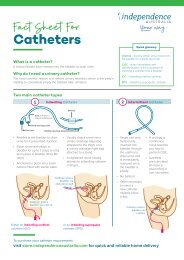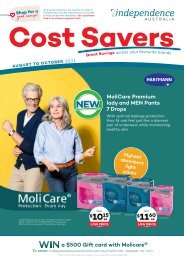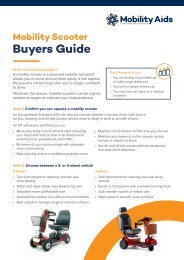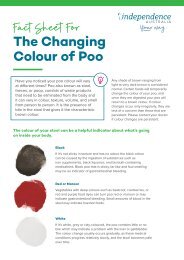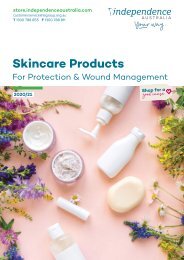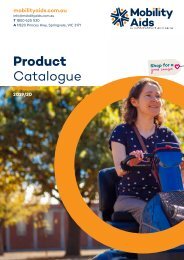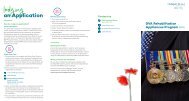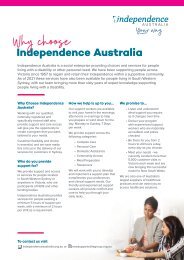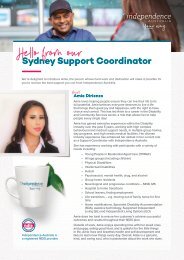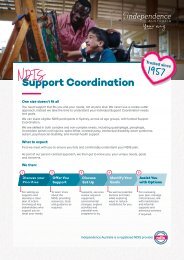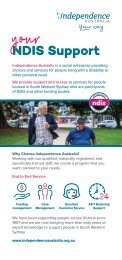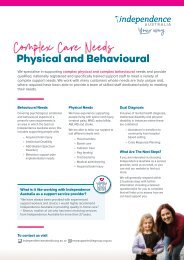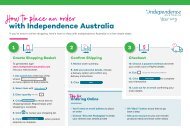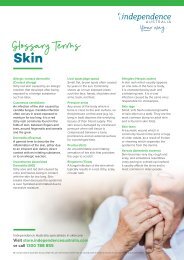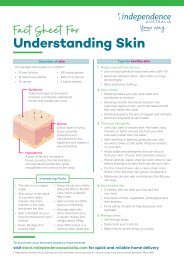Inform issue 28 – Spring 2019
In this issue of Inform we celebrate the change-makers. We follow Caytlyn Sharp, a T20 professional athlete from Western Victoria. We also chat with Alex, an NDIS Support Coordinator.
In this issue of Inform we celebrate the change-makers. We follow Caytlyn Sharp, a T20 professional athlete from Western Victoria. We also chat with Alex, an NDIS Support Coordinator.
Create successful ePaper yourself
Turn your PDF publications into a flip-book with our unique Google optimized e-Paper software.
FEATURE<br />
Revolutionary Radio<br />
NDIS FEATURE<br />
NDIS 101: Support Coordination<br />
COVER FEATURE<br />
Jumping to new heights
<strong>Inform</strong> is<br />
Independence<br />
Australia’s crossdisability<br />
magazine.<br />
We encourage readers to<br />
submit suitable content<br />
for consideration by<br />
Independence Australia. All<br />
correspondence of this nature<br />
should be directed to:<br />
inform@iagroup.org.au<br />
While every effort has been<br />
made to ensure the accuracy<br />
of the information in this<br />
publication, Independence<br />
Australia assumes no<br />
responsibility for errors<br />
or omissions of any<br />
consequences of reliance in<br />
this publication. The opinions<br />
expressed in this publication<br />
do not necessarily represent<br />
the views of Independence<br />
Australia. Medical information<br />
included is not intended to be<br />
a substitute for professional<br />
advice.<br />
Your NDIS journey<br />
of care starts here<br />
The National Disability Insurance Scheme (NDIS)<br />
is a new way to provide support for Australians<br />
with a disability, their families and carers.<br />
CORE<br />
SUPPORTS<br />
Daily activities: In-home<br />
& in the community.<br />
Consumables &<br />
continence products.<br />
CAPACITY<br />
BUILDING<br />
Therapy, skills<br />
development &<br />
co-ordination<br />
of support.<br />
CAPITAL &<br />
ASSISTIVE<br />
TECHNOLOGY<br />
Household aids &<br />
mobility equipment.<br />
As a leading service provider, our dedicated team of co-ordinators are here to<br />
support your journey to the NDIS. We’ve got you covered with a wide range of<br />
products, equipment, services and supports for your NDIS package, all from our<br />
one organisation.<br />
ABN 80 973 805 243<br />
Building 1, 9 Ashley Street<br />
West Footscray VIC 3012<br />
inform@iagroup.org.au<br />
www.independenceaustralia.com<br />
independenceaus<br />
independenceaus<br />
STEP 1.<br />
Preparing<br />
your plan.<br />
STEP 2.<br />
Developing<br />
your plan.<br />
STEP 3.<br />
Getting your<br />
plan approved<br />
by the NDIA.<br />
STEP 4.<br />
Choosing your<br />
providers and<br />
implementing<br />
your plan.<br />
Visit independenceaustralia.com/ndis<br />
to learn more about the NDIS<br />
and how it affects you.<br />
STEP 5.<br />
Reviewing<br />
your plan.
Welcome<br />
informonline.org.au<br />
3<br />
ISSUE #<strong>28</strong><br />
contents<br />
4<br />
A running<br />
start<br />
In this <strong>issue</strong> of <strong>Inform</strong> we celebrate the change-makers<br />
and risk-takers who have helped to form the world as<br />
we know it. In our feature story we visit the athletics<br />
track and talk to Caytlyn Sharp, a T20 professional<br />
athlete from Western Victoria. In her story we see<br />
the importance of determination and passion as she<br />
prepares for the upcoming INAS Global Games in<br />
Brisbane.<br />
Also in this <strong>issue</strong> we chat with Alex, an NDIS Support<br />
Coordinator. In this article Alex explains the intricacies<br />
of the Support Coordination service and provides us<br />
with advice on how to make the most of the service if<br />
you have received funding for it. Support Coordination<br />
is a great gateway into the NDIS, so if you have recently<br />
received funding for it this article is a must read!<br />
<strong>Inform</strong> has also moved online, with our website<br />
<strong>Inform</strong>Online.org.au launching recently. <strong>Inform</strong>Online is<br />
your one place for disability information <strong>–</strong> with articles<br />
and contributors from all over the country. To find out<br />
more visit www.informonline.org.au<br />
The <strong>Inform</strong> team is committed to bringing you quality,<br />
informative content wherever you are in Australia, so we<br />
encourage you to get in touch with us if you have a story<br />
of independence to share. You can reach the team at<br />
inform@iagroup.org.au<br />
Alison Crowe<br />
4<br />
Jumping to new heights<br />
9<br />
NDIS 101: Support Coordination<br />
14<br />
Taking to the trails<br />
18<br />
<strong>Spring</strong> News<br />
20<br />
Lights, Camera and<br />
Accessible Action<br />
24<br />
Revolutionary Radio<br />
26<br />
Driving and the NDIS<br />
29<br />
<strong>Inform</strong> Online<br />
Managing Editor: Alison Crowe<br />
Deputy Editor: Kirby Fenwick<br />
Design: Mark Lovatt<br />
Cover Story Photography:<br />
Meredith O'Shea
4 informonline.org.au Feature
Feature<br />
informonline.org.au<br />
5<br />
Jumping<br />
to new<br />
heights<br />
It’s an overcast Tuesday afternoon<br />
in Warrnambool, a regional city<br />
perched on the south-western<br />
coast of Victoria. At Brauerander<br />
Park, the local athletics facility,<br />
the air is cool and the grey clouds<br />
overhead are threatening rain.<br />
But none of that bothers Caytlyn<br />
Sharp. The seventeen-yearold<br />
from Terang is focused, her<br />
attention turned to her coach as<br />
they discuss minor improvements<br />
to her technique: ways she can<br />
jump further and run faster.<br />
Pics: Meredith O'Shea
6 informonline.org.au<br />
Feature<br />
For Caytlyn, the track is home. A<br />
place where she feels comfortable.<br />
A place she feels free. But it wasn’t<br />
always like that. While today she<br />
has a collection of Australian records under<br />
her belt, Caytlyn’s entry into the world of<br />
athletics was anything but smooth.<br />
‘It wasn't a great start,’ Caytlyn’s mum Cindy<br />
recalls, explaining that when Caytlyn’s older<br />
siblings decided they wanted to try athletics<br />
she had no choice but to follow.<br />
‘Her first athletics experience at<br />
Camperdown Little Athletics was running<br />
the 100 metres. She screamed the whole<br />
way.’<br />
‘And basically, we dragged her to athletics.<br />
Literally. I had to lift her into the car for<br />
the first probably 10 weeks of the 14-week<br />
season. And towards the end, we could get<br />
her in, but she still didn’t want to be there.’<br />
‘And then we had the end of year<br />
presentations, and she actually got an<br />
improvement medal,’ Cindy said.<br />
That first medal was a turning point for<br />
Caytlyn, who credits it as the moment she<br />
fell in love with athletics.<br />
‘First of all, yeah, I hated it. And I didn't want<br />
to go and screamed and just didn't want<br />
to be there. But then after a year or so of<br />
doing it, I won a medal at a presentation<br />
night and I fell in love with it. And I was like, I<br />
got a medal! And I kept going back and just<br />
kept wanting to do better and keep winning<br />
medals and I ended up loving it,’ Caytlyn<br />
said.<br />
Cindy agrees, smiling at the memory. 'Once<br />
she saw the medal [she said] I want to go<br />
back Mum, I want to do this again.'<br />
Caytlyn has Autism Spectrum Disorder<br />
(ASD) and an Intellectual Disability (ID). She<br />
was diagnosed nearly ten years ago and<br />
competes in the T20 classification. The<br />
combination of ASD and ID poses some<br />
challenges for the young athlete, with<br />
noisy crowds cheering and clapping and<br />
unfamiliar tracks among them. But Cindy<br />
believes athletics has had a positive impact<br />
on Caytlyn.<br />
‘She basically found her thing.’<br />
‘It was the first time [I’d] actually seen<br />
her focus and her meltdowns went from<br />
probably every day, and you know, very<br />
extreme meltdowns to maybe two, three<br />
times a week. And then down to maybe<br />
once a week,’ Cindy said.<br />
Still, challenges remain.<br />
‘A child with ASD can look like any other<br />
child in a classroom, on a sporting field,’
Feature<br />
informonline.org.au<br />
7<br />
‘When I get<br />
out there, I<br />
just feel so<br />
free. And like<br />
nothing else<br />
matters.’<br />
Cindy said. ‘And it can be really frustrating<br />
for her as well.’<br />
‘At competitions a lot of the officials think<br />
because I do have a disability, a learning<br />
disability, that [they] have to treat me like I’m<br />
a little kid and I don’t understand anything<br />
but, when it comes to athletics, I probably<br />
understand more than what they do,’<br />
Caytlyn said.<br />
Despite her rocky entry into the world of<br />
athletics, Caytlyn’s potential was spotted<br />
early. The Terang College student was<br />
named in the Australian Squad for the 2017<br />
World Athletics Championships run by<br />
the International Federation for Athletes<br />
with Intellectual Impairments at only 14.<br />
She travelled to Thailand with the team,<br />
something Cindy says was ‘pretty scary’<br />
for her as a parent. But Caytlyn triumphed,<br />
coming home a World Champion after<br />
winning gold in the High Jump and Bronze<br />
in the Triple Jump and the 4 x 100m Relay.<br />
Now that she’s found her thing, Caytlyn has<br />
big dreams. And a big training schedule to<br />
match. Although that too came with a rocky<br />
beginning.<br />
‘[At] first it was like, oh this is horrible. But<br />
then it started getting more fun,’ Caytlyn<br />
said.<br />
‘I just started to enjoy it and think this is<br />
what’s going to help me improve so it’s all<br />
worth it.’<br />
Today, when the teenager talks about<br />
her training schedule or the cities she<br />
has visited in the last twelve months for<br />
competitions—Sydney, Cairns, Adelaide,<br />
Darwin—a grin spreads across her face.<br />
‘When I get out there, I just feel so free. And<br />
like nothing else matters.’<br />
Coach Jeremy Dixon, himself a former world<br />
class sprinter, works with Caytlyn three to<br />
four times a week and describes her as a<br />
pleasure to coach.<br />
‘She's very determined, I think she really<br />
switches on when it comes to training and<br />
athletics. She listens which is fantastic. And<br />
she's not afraid to give me a few comments<br />
back as well,’ Jeremy says, laughing.<br />
Cindy credits the coach-athlete relationship<br />
Caytlyn and Jeremy share as instrumental in<br />
her daughter’s success.
8 informonline.org.au<br />
Feature<br />
Below: Caytlyn with her<br />
coach, former sprinter,<br />
Jeremy Dixon<br />
‘She’s just coming<br />
along in leaps and<br />
bounds with Jeremy,<br />
coming along in<br />
leaps and bounds in<br />
distances’<br />
best again. And I’m also looking forward<br />
to competing in the long jump as well. I’m<br />
hoping to get a big [personal best] there<br />
as well and just try to get closer to the<br />
Paralympics,’ Caytlyn said.<br />
‘She’s just coming along in leaps and<br />
bounds with Jeremy, coming along in leaps<br />
and bounds in distances,’ Cindy said.<br />
Jeremy is confident that Caytlyn has more<br />
success coming her way. At the Arafura<br />
Games in Darwin earlier this year, she broke<br />
her own under 18 long jump record.<br />
‘She still jumped from miles behind the<br />
board so there's certainly more to come<br />
and you can already see the confidence<br />
from some of those successes after all the<br />
training really sort of lift her energy and<br />
passion for the future which is great,’ he<br />
said.<br />
Despite her busy training and competition<br />
schedule, Caytlyn still finds time to<br />
encourage other young people to take up<br />
sport, whether through her role as an INAS<br />
Ambassador or her work training younger<br />
kids at her local Little Athletics Club. She<br />
wants to inspire others, especially women,<br />
to get involved in sport.<br />
‘I love trying to encourage people to get<br />
into the sport. It's just what I love to do as<br />
well, because I know how happy it makes<br />
me feel. So as long as it can make another<br />
person happy, then I'm happy.’<br />
While not her favourite event, long jump has<br />
become Caytlyn’s focus as her preferred<br />
event, high jump, is not among those<br />
offered to T20 athletes at the Paralympics.<br />
But before any conversations about the<br />
Paralympics are had, Caytlyn is focussed<br />
on the upcoming INAS Global Games in<br />
Brisbane.<br />
‘I love competing at those levels and just get<br />
very excited about it.’<br />
‘I’m mainly looking forward to competing in<br />
the high jump again and hopefully winning it<br />
back-to-back or just at least get a personal
NDIS Feature<br />
informonline.org.au<br />
9<br />
NDIS 101:<br />
Support<br />
Coordination<br />
We’ve all done it: made up an excuse or convinced ourselves<br />
With more of a reason than 80,000 not to people go out. accessing Maybe it was supports a colleague’s for the first party, time<br />
through a drink the NDIS, with old the schoolmates role of support coffee coordination with Aunt is especially Mavis. And<br />
important. maybe But you’ve what come exactly up is with support creative coordination? reasons, telling What can yourself<br />
support ‘it might coordinator rain’, ‘they do for won’t you? notice And how if I skip can it’, your and support the perennial coordinator<br />
help you to get the most classic: out of ‘I’ll your go plan? next time’.<br />
<strong>Inform</strong> It’s spoke a habit with worth Alex, breaking. a support For coordinator one, memorable who has experiences worked in the<br />
role<br />
don’t<br />
for almost<br />
just knock<br />
two years,<br />
at your<br />
to<br />
front<br />
get the<br />
door.<br />
answers<br />
But more<br />
to those<br />
than<br />
questions<br />
that, getting<br />
and<br />
out can encourage other people to venture out too. And this<br />
much more.<br />
can only be good. Being visible in our communities does more<br />
for disability awareness than you might think.
10 informonline.org.au NDIS Feature<br />
How can your Support Coordinator<br />
assist you?<br />
While they aren’t advocates or decision<br />
makers, there is plenty that your support<br />
coordinator can do to assist you.<br />
What is Support Coordination?<br />
Support Coordination is a new role within<br />
the NDIS. And while the scope of the role<br />
is quite broad, Alex says that support<br />
coordination is about building your capacity<br />
and helping you see the possibilities and<br />
opportunities available to you.<br />
The role of support coordination in your plan<br />
will depend on your situation and what your<br />
individual needs and wants are. The task<br />
of your support coordinator is to assist you<br />
to explore and determine what your goals<br />
are or might be, what services or supports<br />
you might need to achieve them and how<br />
you can access those services or supports.<br />
Support coordination can be particularly<br />
useful when you first get your plan and<br />
need help working out what those services<br />
and supports are and how to get them<br />
implemented.<br />
But Alex says that the role of support<br />
coordination is about more than just NDIS<br />
related supports. Your support coordinator<br />
can also help you access mainstream and<br />
community supports and support you in<br />
your interactions with other government<br />
systems.<br />
‘It’s like Maslow’s hierarchy of needs, once<br />
those needs at the bottom of that pyramid<br />
are met, then people have the ability to start<br />
thinking about other things,’ she said.<br />
‘It's not just, oh I'm having an <strong>issue</strong> with my<br />
provider that comes in every day, to help me<br />
with self-care, can you help me with that, it's<br />
also: I want to go on holiday.’<br />
In addition, your support coordinator can<br />
work with you to support your informal<br />
support networks. Because if your support<br />
networks are better supported then you can<br />
be better supported.<br />
Support coordination could be considered<br />
holistic capacity building. From navigating<br />
a crisis to planning a holiday, your<br />
support coordinator can act as research<br />
tool providing you with knowledge and<br />
facilitating access to skills building that you<br />
can then use to engage with the people<br />
in your life, whether that’s your support<br />
workers or your family.<br />
‘Sometimes people just need someone<br />
to walk through things with them. And<br />
sometimes we might be that right person<br />
the first time or the second time, then it's<br />
about planning together to work out how<br />
you can be supported. What can we put in<br />
place for next time? Or is there a support<br />
or service we can engage to help you build<br />
these skills?’ Alex said.<br />
‘The capacity building part of our role is<br />
always there. But I guess you turn it up at<br />
certain times, and then you turn it down at<br />
other times. It's very dynamic.’<br />
‘It's definitely about reducing barriers. What<br />
are the gaps in your supports? What's the<br />
current situation? These are your goals,<br />
where are we at now? And then mapping<br />
out some of the main barriers, and then it's<br />
about putting in an action plan of how you're<br />
going to work together to reduce those<br />
barriers.’<br />
Alex points to something as seemingly<br />
simple as joining a local community group.<br />
‘So, what would you need to get there? Or<br />
what are the barriers? And those barriers<br />
might be: "I can't get there" or "I don't get<br />
up in time" or "a shift doesn't start in time to<br />
help me get up, so I can get to this group".<br />
So, it's literally about going right back to<br />
what is it that's getting in the way and then<br />
slowly breaking down those barriers.’
NDIS Feature<br />
informonline.org.au<br />
11<br />
How to get the most out of Support<br />
Coordination<br />
While it takes time to build relationships,<br />
Alex has some advice for how you can get<br />
the most of support coordination.<br />
‘I think it starts right from the beginning with<br />
understanding what support coordination<br />
is and how vital it is to assist you to achieve<br />
your goals,’ Alex said.<br />
Part of that is knowing that you can choose<br />
your own support coordinator, and that<br />
before you choose, you can ask them<br />
questions. Alex likens it to interviewing.<br />
‘[NDIS] participants are consumers. And<br />
it’s like engaging any sort of service.<br />
For example, if I was looking to engage<br />
someone, a nanny or something like that,<br />
you would sit down with them and you<br />
would you do some screening. You'd ask<br />
them questions. It's the same, participants<br />
have the same choice. People have control<br />
over who provides their support to them.’<br />
In those initial conversations, Alex suggests<br />
discussing what your goals are and asking<br />
how the support coordinator could help you<br />
achieve those goals.<br />
‘Don’t be afraid to ask questions. Don't be<br />
afraid to ask your support coordinators<br />
those hairy questions. There are no silly<br />
questions,’ Alex said.<br />
In addition, don’t shy away from expressing<br />
your needs, from telling your support<br />
coordinator what’s working for you and<br />
what’s not working. Alex says that can help<br />
your support coordinator to have a better<br />
understanding of how to work with you to<br />
best achieve your goals.<br />
‘Sharing how you communicate; how do<br />
you best receive information? How do you<br />
learn?’<br />
‘Some people need information mailed out<br />
to them. Some people can read emails, and<br />
it's fine. Some people need a text. Everyone<br />
has got different communication styles. So<br />
being really clear with any service providers<br />
about how you need your information.’<br />
Although the role of a support coordinator<br />
can be complex, Alex says she’s excited<br />
about the ‘innovative power of the role’ and<br />
what it can mean to people with disabilities<br />
exercising choice and control.<br />
‘Working with participants, helping them<br />
maximise what's in their plans, and thinking<br />
of it in new ways. And being really creative<br />
about how to get what it is that they want<br />
and achieve those goals.<br />
‘I think that it's comforting to know that<br />
eventually, if we work really well with people<br />
and actually really deliver on that capacity<br />
building aspect of our role that eventually<br />
those people will be exercising those<br />
choices and will feel in control.’<br />
‘I think it starts right from the<br />
beginning with understanding<br />
what support coordination is<br />
and how vital it is to assist you<br />
to achieve your goals’<br />
Questions to ask potential<br />
Support Coordinators<br />
Once you’ve received funding for support<br />
coordination, the next step is choosing a<br />
support coordinator. Alex has some advice<br />
for the kinds of questions you can ask a<br />
support coordinator to determine if they are<br />
a good fit for you.<br />
• How long have you been a support<br />
coordinator?<br />
• What sort of experience do you have?<br />
• How many participants are you working<br />
with right now?<br />
• What kinds of complexities do these<br />
participants have?<br />
• What hours do you work?<br />
• Do you attend workshops/professional<br />
development?<br />
• What’s your reporting style like?<br />
• These are my goals; how would you<br />
help me?
Depend ® Super Unisex<br />
Underwear Extra Small<br />
Extra small leg opening<br />
Leak Lock System with overnight absorbency<br />
and leakage protection<br />
To request a free sample,<br />
call 1300 788 855 toll free<br />
or fax 1300 788 811.<br />
®/TM Trademarks of Kimberly-Clark Worldwide, Inc. or its affiliates. © KCWW.
14 informonline.org.au Feature<br />
Taking to<br />
the trails<br />
Anthony Bartl remembers the moment clearly. He<br />
was in the Grampians National Park, north-west of<br />
Melbourne in Victoria, when he came to a clearing in<br />
the forest and found himself taken aback by what he<br />
saw.<br />
‘There was this whole family of kangaroos, so<br />
there were joeys, their parents, it was just a pretty<br />
awesome, awe-inspiring sight. I'd never seen anything<br />
like it. The kangaroos just sat there, and they weren't<br />
perturbed by the sight of me being in a TrailRider,’<br />
Anthony said.
Feature<br />
informonline.org.au<br />
15<br />
After an accident left him a<br />
quadriplegic, Anthony’s access<br />
to the natural wonders of the<br />
Australian bush shrunk. He<br />
credits the TrailRider with giving him some<br />
of that access back.<br />
‘[It] takes me back to before the accident.<br />
I used to go for long walks with my family<br />
before my accident. Yeah, it's just like being<br />
back there and amongst the people again<br />
and not feeling excluded because I'm in a<br />
wheelchair,’ he said.<br />
‘You can lift it across riverbeds and [take it<br />
to] inhospitable terrain. I love that fact, that<br />
you can access a lot more places that are<br />
usually inaccessible in a wheelchair.’<br />
‘I'm a real lover of the bush and the<br />
outdoors so to be able to get more amongst<br />
that it was just a wonderful feeling and<br />
experience.’<br />
‘It's just liberating. It's just a fantastic feeling<br />
and sensation.’<br />
Today there are TrailRiders at parks<br />
across the country. And that is thanks to<br />
the advocacy of one man: David Stratton.<br />
David had seen the innovative design in<br />
action while holidaying in Canada. When<br />
he returned home to Victoria, he contacted<br />
Parks Victoria immediately.<br />
‘He was the real instigator and motivator,’<br />
said Shauna Jones, Senior Manager of<br />
Health & Community Activation at Parks<br />
Victoria.<br />
‘He came back to Parks Victoria and said,<br />
I've seen this fantastic apparatus that<br />
allowed me to get out into the mountains<br />
and go reconnect with nature in a way that<br />
I used to as a boy. And he set about really<br />
advocating very strongly to Parks Victoria to<br />
consider buying these TrailRiders, a number<br />
of them, to try and open up parks to people<br />
with mobility <strong>issue</strong>s.’<br />
David’s persistence paid off and Parks<br />
Victoria purchased a number of TrailRiders.
16 informonline.org.au<br />
Feature<br />
‘I'd say to not<br />
have any fear<br />
and to give it a<br />
go even though<br />
you might have<br />
reservations’<br />
Below: Thanks to the advocacy<br />
of David Stratton, there are now<br />
TrailRiders across the the country.<br />
Today, Shauna says the TrailRiders are in<br />
‘pretty much constant use’ with a steady and<br />
upward trajectory of usage.<br />
‘We have them down on the Mornington<br />
Peninsula and in the Grampians and up in<br />
the Dandenongs. We have one in Listerfield<br />
Park, which is a metropolitan park out in<br />
southeast Melbourne. We have one down<br />
at Wilson's Prom. So, they are in positions<br />
that are in fantastic either locally accessible<br />
parks or national or state parks that are<br />
actually well used,’ Shauna said.<br />
‘And what we also try to make sure of is that<br />
there are other amenities which are going to<br />
support the visit so that [includes] disability<br />
access toilets, car parking, some of those<br />
sorts of things that actually just help the<br />
individual and their carer and their families<br />
to actually get to the site where they can<br />
actually use it.’<br />
In addition to providing the TrailRiders<br />
free of charge, Parks Victoria also provide<br />
volunteers who are trained to operate<br />
the TrailRider. The ‘sherpas’ as they<br />
are affectionately known, can assist in<br />
manoeuvring the TrailRider throughout the<br />
park.<br />
The TrailRider is just one way that Parks<br />
Victoria is working to make their parks<br />
more accessible. From social scripts for<br />
people with sensory disabilities to inclusive<br />
playscapes and accessible boat ramps and<br />
canoe launchers, accessibility and universal<br />
design is something that is a ‘driving mantra’<br />
for the organisation, Shauna said.<br />
‘I would absolutely encourage everyone to<br />
give [the TrailRider] a go. And bring friends<br />
or family with them so that everybody can<br />
join in because it's going to broaden their<br />
horizons, going to take them further than<br />
just an afternoon at a picnic table in a park.<br />
It's going to get them out in nature, on the<br />
trails, like everybody else,’ Shauna said.<br />
It is sentiment echoed by Anthony, who<br />
encourages people to ‘give it a go’.<br />
‘I'd say to not have any fear and to give<br />
it a go even though you might have<br />
reservations,’ he said.<br />
‘Just to give it a go and [don’t] be put off by<br />
a new experience. If you don’t try it, you'll<br />
never know what places it could take you<br />
and how it will feel.’
Feature<br />
informonline.org.au<br />
17<br />
Where you can find<br />
TrailRiders<br />
ACT<br />
Tidbinbilla Nature Reserve, Canberra<br />
E: info@tidbinbilla.com.au<br />
New South Wales<br />
Kamay Botany Bay National Park<br />
Dorrigo National Park<br />
Kosciuszko National Park<br />
E: parks.accessibility@environment.nsw.<br />
gov.au<br />
Victoria<br />
Buchan Caves Reserve<br />
P: (03) 8627 4700<br />
Grampians National Park<br />
P: (03) 8427 2058<br />
Dandenong Ranges National Park<br />
P: (03) 9755 <strong>28</strong>88<br />
Wilsons Promontory National Park<br />
P: (03) 8427 2122<br />
Colac Otway Shire (Manual TrailRider)<br />
E: gorvic@colacotway.vic.gov.au<br />
Hepburn Shire (Manual TrailRider)<br />
E: events@hepburn.vic.gov.au<br />
Loddon Shire (Motorised TrailRider)<br />
E: loddonvisitorinformation@loddon.vic.<br />
gov.au<br />
Moorabool Shire (Manual TrailRider)<br />
E: info@moorabool.vic.gov.au<br />
Mt Beauty Visitor <strong>Inform</strong>ation Centre<br />
(Manual TrailRider)<br />
P: 1800 111 885<br />
Surf Coast Shire (Manual TrailRider)<br />
E: surfcoastsrc@surfcoast.vic.gov.au<br />
Warburton Visitor <strong>Inform</strong>ation Centre<br />
(Motorised TrailRider)<br />
E: info@visitwarburton.com.au<br />
Tasmania<br />
Cradle Mountain Park<br />
E: cradle@parks.tas.gov.au<br />
From little things<br />
big things grow<br />
When a skiing accident left Canadian teenager Sam<br />
Sullivan a quadriplegic in 1979, he was determined<br />
to continue the active life he’d always led. Despite<br />
playing wheelchair basketball and rugby, Sam really<br />
missed getting out in nature and feeling the ‘sun on<br />
his face and the wind in his hair’. Knowing he couldn’t<br />
be the only person with a disability feeling like this, he<br />
founded the British Columbia Mobility Opportunities<br />
Society (BCMOS) in 1988. The society’s mission<br />
was to facilitate access to the parks and trails in the<br />
Vancouver area. But Sam wanted to do more than that.<br />
In the early years of the society, he worked on the idea<br />
of a battery-powered cart that could get him out on the<br />
trails, but the design was riddled with problems.<br />
It wasn’t until the mid-90s when Sam caught up with<br />
Paul Cermak, a retired engineer who had helped Sam<br />
previously with some home modifications that the idea<br />
really took off. Over coffee, the pair devised the idea<br />
for a ‘one-wheeled access device’. The first plans for<br />
what would become the TrailRider were drawn on the<br />
back of a napkin. By 1995, BCMOS had begun building<br />
TrailRiders.<br />
From an idea, to a sketch on a napkin, to Paul<br />
Cermak’s garage, to Everest Base Camp: the Trail Rider<br />
has come a long way. Some twenty years after the<br />
initial idea, Trail Riders can be found in parks around<br />
the world and at places as majestic and previously<br />
inaccessible as Mt Kilimanjaro, the floor of the Grand<br />
Canyon and Machu Picchu.
18 informonline.org.au<br />
News<br />
Dylan Alcott wants to remove the barriers faced<br />
by people with disabilities.<br />
Elly Desmarchelier is sharing her story of discrimination with<br />
the Remove the Barrier campaign to inspire change.<br />
Tennis champ breaking down barriers<br />
He may be a Wimbledon champion, but that<br />
doesn’t mean Dylan Alcott hasn’t experienced<br />
unconscious bias and discrimination. And it’s<br />
exactly this that he is determined to dismantle<br />
as he works to breakdown the barriers that<br />
people with disability face in the workforce with<br />
the new campaign Remove the Barrier.<br />
Find more information<br />
about Remove<br />
the Barrier at<br />
removethebarrier.com<br />
‘One of the hardest things to overcome<br />
is actually the barriers that you can’t<br />
see,’ Alcott told Triple J’s Hack.<br />
‘Those invisible barriers are things like<br />
unconscious bias and discrimination.’<br />
‘You can’t see unconscious bias, but I<br />
promise you, as someone who’s faced<br />
it, you can feel it,’ he said.<br />
Dylan points to things like the<br />
assumption that people with disability<br />
are broken, or less capable because of<br />
their disability and a lack of expectation<br />
as just some of the bias faced by<br />
people with disability.<br />
The campaign features the stories of 15<br />
people with disability and the barriers<br />
they have faced finding work.<br />
Twenty-six-year-old Elly Desmarchelier,<br />
a communications professional with<br />
cerebral palsy, is often the ‘first one<br />
at the table who’s ever been in a<br />
wheelchair’.<br />
‘I’ve often come across these really<br />
outdated, kind of odd ways of thinking<br />
about disability,’ Elly said.<br />
‘And a lot of that comes from just never<br />
having anyone else in the workplace<br />
that is disabled.’<br />
Despite her considerable experience,<br />
Elly has still faced discrimination and<br />
bias in the workplace and during<br />
interviews. But she’s committed to<br />
making change.<br />
‘If we’re going to create workplaces<br />
that are inclusive and creative and<br />
productive and reflect the best parts<br />
of our society, you are gonna have<br />
to look for different people. And that<br />
means people with disabilities, it means<br />
women, it means people of colour and<br />
I just really hope that there are leaders<br />
out there who go ‘OK. You didn’t take<br />
the same path I took to get there, but<br />
that’s OK. And we’re gonna make your<br />
path work for this business because I<br />
can see that you’re gonna add to it.’
News<br />
informonline.org.au<br />
19<br />
Health Services<br />
Funded<br />
In a positive development for NDIS<br />
participants, daily health services<br />
including swallowing therapy, catheter<br />
cleaning and wound dressings will<br />
soon be funded via the NDIS. The<br />
news comes after a ruling by the<br />
Administrative Appeals Tribunal that<br />
the NDIA should fund necessary<br />
swallowing supports for a 34-year-old<br />
man with dysphagia and cerebral palsy.<br />
Following the ruling, the Council<br />
of Australian Governments (COAG)<br />
agreed that the NDIS should fund<br />
daily health services that are needed<br />
because of disability. It’s estimated that<br />
up to 60,000 people with conditions<br />
such as dysphagia, diabetes and<br />
epilepsy will be entitled to funding.<br />
Accessible formats<br />
NDIS correspondence will now be available in a greater<br />
range of accessible formats thanks to the advocacy of<br />
Blind Citizens Australia. Large font, audio, e-text and braille<br />
formats will be available to NDIS participants over the coming<br />
months as the NDIA moves away from a manual system<br />
to an automated system that will recognise the preferred<br />
communication format of NDIS participants.<br />
'This is a tremendously important step forward for people<br />
who are blind or vision impaired. Blindness is often referred<br />
to as an information-based disability. Access to information<br />
is often the only thing that prevents a person who is blind<br />
or vison impaired from carrying out tasks and activities that<br />
they otherwise could,’ said Rikki Chaplin, Acting CEO of Blind<br />
Citizens Australia.<br />
‘To be able to easily read your NDIS plan is vital if you’re<br />
going to be able to take full advantage of the supports in your<br />
plan,’ Chaplin said.<br />
NDIS participants will need to update their preferred format<br />
via the contact centre or the portal.<br />
Specialised support<br />
National Disability Services have launched a pilot project that<br />
will recruit support workers with specialised skills for specific<br />
roles. In reporting the news, Pro Bono News highlighted the<br />
case of drummer Bryan Casey, who hadn’t performed for<br />
nine years after a brain tumour affected his mobility. To get<br />
back on stage, Bryan needed the support of someone with<br />
specialised experience working with drum equipment. The<br />
pilot project connected Bryan with Marco, and the pair have<br />
worked together to get Bryan back performing.<br />
National Disability Services Workforce Impact Collective cochair,<br />
Wendy Prowse, told Pro Bono that there couldn’t be a<br />
‘one size fits all approach to support work’.<br />
‘Recruiting personalised support that is based on shared<br />
interests between a person with a disability and the individual<br />
who will be supporting them is allowing people like Bryan to<br />
really pursue their goals,’ Ms Prowse said.<br />
Virtual resource for<br />
women and girls<br />
Women and girls with disability around<br />
the country are leading the design<br />
and development of a new virtual<br />
information source from Women with<br />
Disabilities Australia. The Virtual Centre<br />
website will ‘provide accessible and<br />
inclusive information and resources<br />
across four areas: leadership and<br />
opportunities; decisions and choices;<br />
sexuality, women’s health and family;<br />
and safety from all forms of violence’.<br />
No date has been released for the<br />
launch of the Virtual centre, however<br />
more information can be found at<br />
www.wwda.org.au
20 informonline.org.au<br />
Feature<br />
Lights,<br />
Camera,<br />
Accessible<br />
Action<br />
Founded in 2009, Bus Stop Films is a not-for-profit organisation<br />
creating award-winning films that feature people with disability<br />
behind and in front of the camera. The organisation also offers<br />
educational opportunities and advocates for the employment of<br />
people with disabilities in the film industry.<br />
<strong>Inform</strong> caught up with Bus Stop Films CEO, Tracey Corbin-<br />
Matchett and student, Shay Bell to find out more about the<br />
organisation and inclusivity in the<br />
film industry.
Feature<br />
informonline.org.au<br />
21<br />
A<br />
desire to connect people and<br />
a passion for film and inclusion<br />
are just a few of the things that<br />
drive Tracey Corbin-Matchett.<br />
Married to her best friend and raising three<br />
children, two of whom live with disability,<br />
Tracey made the switch to the film and<br />
TV industry five years ago after working<br />
in social housing and domestic violence<br />
services. Shaped by her childhood and her<br />
experiences growing up in public housing,<br />
Tracey wants to change the way the world<br />
supports vulnerable people. But film is<br />
not her only passion. Sport also features<br />
largely in her life. A director of Deaf Sports<br />
Australia, Tracey, who is hard of hearing,<br />
loves the way sport, like film, can bring<br />
people together.
22 informonline.org.au<br />
What and who are Bus Stop Films?<br />
Bus Stop Films is a pioneering, not for<br />
profit organisation based in Sydney. We<br />
are dedicated to building the confidence,<br />
English skills and work ready skills of people<br />
with an intellectual disability and others from<br />
marginalised communities, through giving<br />
them access to a ‘film school experience’.<br />
We use filmmaking and the film industry to<br />
raise the profile of people with disability<br />
on both sides of the camera. We educate<br />
through our award-winning Accessible<br />
Film Studies Program, we create amazing<br />
films which win many awards and screen<br />
at festivals all around the world and we<br />
advocate for authentic casting and open<br />
employment pathways for people living<br />
with disability in the film and TV industry.<br />
We deliver our programs in Sydney through<br />
AFTRS, in Parramatta through <strong>Inform</strong>ation<br />
and Cultural Exchange and in Mongolia<br />
through the Arts Council of Mongolia. In<br />
2020, we are expanding to Canberra in<br />
partnership with Screen Canberra and<br />
returning to Wollongong in a soon to be<br />
announced partnership.<br />
Our program is so unique,<br />
there is no one else delivering<br />
a structured professional<br />
level film school program to<br />
people with disabilities.<br />
Why are programs like those delivered by<br />
Bus Stop Films and work produced by Bus<br />
Stop Films so important?<br />
Our program is so unique, there is no one<br />
else delivering a structured professional<br />
level film school program to people<br />
with disabilities. There are a lot of craftbased<br />
programs, but the importance<br />
of our program is that it offers students<br />
professional work opportunities to make<br />
a film with industry mentors and gain<br />
experience on professional productions.<br />
This year we have had students work<br />
on the production of a comedy series<br />
The Other Guys with Aquarius Films and<br />
MasterChef with Endemol Shine and a suite<br />
of commercial projects with our partner<br />
organisation Taste Creative and much more.<br />
Additionally, the films we make are<br />
high quality entertainment, they are not<br />
traditional “student films”. We show that<br />
inclusive filmmaking does not inhibit<br />
production costs or quality and that through<br />
film, we can show the world the capacity<br />
and capability of people living with disability.<br />
We use film to show what people living with<br />
disability can achieve if they are given the<br />
opportunity to.
informonline.org.au<br />
23<br />
Shay Bell attended a free workshop<br />
held by Bus Stop Films when they<br />
launched their western Sydney<br />
program last year and the rest, as<br />
they say in the movies, is history. The year<br />
12 student, who cites musicals Mamma Mia<br />
and Grease as his favourite films, joined<br />
the organisation’s Parramatta program<br />
this year and has fast become a valued<br />
member of the class. Tracey describes<br />
Shay as a ‘brilliant student, very switched<br />
on and knowledgeable about filmmaking,<br />
especially the technology’. Sport is also on<br />
Shay’s agenda. The nineteen-year-old plays<br />
basketball and soccer and regularly attends<br />
rugby and soccer games. But it’s theatre he<br />
sees his future in.<br />
How did you become involved with Bus<br />
Stop Films?<br />
I became involved in Bus Stop Films by<br />
going to a trial class last year and attending<br />
the red carpet event at Event Cinemas<br />
George Street put on by Bus Stop Films.<br />
What sort of work do you do with Bus Stop<br />
Films?<br />
At Bus Stop Films this year we are making a<br />
virtual reality film. We recently learned about<br />
mise en scène, analysing different films like<br />
Presto, The Lion King, The Wizard of Oz, Toy<br />
Story 2, Harry Potter and the Philosopher’s<br />
Stone and The Hobbit. We have also been<br />
learning about different types of shots like<br />
extreme wide shot, wide shot, extreme close<br />
up, a two-shot, over-the-shoulder-shot,<br />
point-of-view-shot, medium close up, close<br />
up and a mid shot. We have been analysing<br />
the shots in films like Star Wars I. We have<br />
also been learning about camera angles<br />
and the different types. For example, eye<br />
level, high angle, low angle and dutch tilt.<br />
We watched Batman Forever to analyse the<br />
shots and camera angles. We have recently<br />
started learning about what happens in preproduction,<br />
production and post-production.<br />
What do you enjoy about working with film?<br />
I enjoy learning how to use the camera and<br />
editing.<br />
What do you hope to do after you finish<br />
high school?<br />
After completing my Year 12, I hope to work<br />
as a backstage crew member doing sound<br />
and lighting at live theatre productions.<br />
What would be your advice to anyone<br />
thinking about studying or working in the<br />
film industry?<br />
I would recommend to anyone thinking<br />
about studying or working in the film<br />
industry to expect to have a lot of fun but<br />
also be prepared for quite a lot of theory<br />
work that you have to do. It’s not all<br />
practical work.
24 informonline.org.au<br />
Feature<br />
Revolutionary<br />
Radio<br />
Tune your radio dial to 1197AM on a Monday<br />
morning in Melbourne and you’ll hear<br />
readings from The Age and The Herald Sun<br />
on The Morning Paper Round. Swing back<br />
at 1pm for Afternoon Live and two hours<br />
of ‘light, bright and entertaining readings’<br />
and if you’re looking for something a little<br />
more serious, try The Conversation at<br />
5pm, a current affairs and news show that<br />
features readings from The Conversation<br />
website. These programs can be found on<br />
Vision Australia Radio, a radio service for<br />
people with a print disability with a monthly<br />
audience of more than 700,000 people.<br />
Five million Australians have a print<br />
disability. From learning and literacy<br />
disabilities like dyslexia to physical<br />
disabilities including arthritis, spinal<br />
disability, multiple sclerosis and cerebral<br />
palsy to vision impairments, the audience for<br />
radio services like Vision Australia Radio is<br />
as diverse as it is large.<br />
The origins of today’s Vision Australia<br />
Radio services can be found in programs<br />
broadcast on radio stations in the 1970s<br />
in Melbourne. One of those shows was A<br />
Blind Affair. With a dual goal of providing<br />
information and resources for people with<br />
vision impairments as well as educating<br />
the wider public about the lived experience<br />
of people with a vision impairment, A<br />
Blind Affair was the precursor to the<br />
establishment of specialised radio services<br />
for people with a print disability in 1978.<br />
For Conrad Browne, the manager of Vision<br />
Australia Radio, the revolutionary roots<br />
of the radio services broadcast by Vision<br />
Australia in Victoria, South Australia and
Feature<br />
informonline.org.au<br />
25<br />
Western Australia are matched by their<br />
contemporary innovation.<br />
‘It was a quite an interesting way of using<br />
the community radio network to deliver<br />
this service publicly. In a way, it was really<br />
revolutionary, because you were using<br />
something that reaches a lot of people in a<br />
way that was truly accessible. Everyone had<br />
a radio in their home,’ he said.<br />
‘As time has gone on, a lot of changes<br />
have occurred within the space. But still,<br />
to this day, we primarily deliver readings<br />
of newspapers, books, and magazines<br />
alongside specialist programming,’ Conrad<br />
said.<br />
‘It's a really interesting format for radio<br />
as well. It literally is relaying information.<br />
There's no editorialising, there's no<br />
commentary. It's a skill. And it's a really<br />
interesting way of delivering that<br />
information. But using radio to do it just<br />
makes a lot of sense,’ Conrad said.<br />
Vision Australia Radio broadcasts shows<br />
covering news and current affairs alongside<br />
specialist programming about topics as<br />
wide-ranging as film, finance, health,<br />
gardening, politics, pop culture and sport.<br />
More recently, the organisation has worked<br />
to engage people within the blind, low vision<br />
and print disability community to share their<br />
stories and lived experience, shifting them<br />
from the audience and into the studio.<br />
’We're branching out into what I think of as<br />
really traditional community radio, which is<br />
having more programming being delivered<br />
by our community of interest,’ Conrad said.<br />
With more than 800 volunteers across<br />
the country and an audience of more than<br />
700,000 monthly listeners, the Vision<br />
Australia Radio network includes 15 AM<br />
radio services in Melbourne, Adelaide and<br />
Perth, seven services in regional Victoria<br />
and five digital radio services available<br />
online or on digital radio.<br />
You can support the work of Vision Australia<br />
Radio at www.varadio.org<br />
Vision Australia<br />
Radio Shows<br />
Afternoon Live<br />
A ‘daily breath of fresh air’,<br />
Afternoon Live features<br />
entertaining readings from<br />
newspapers and magazines and<br />
can be heard from 1pm-3pm,<br />
Monday to Friday.<br />
Computalk<br />
Airing on Mondays at 3pm,<br />
Computalk discusses new<br />
technology and gadgets, providing<br />
advice on computers. The show<br />
is hosted by Tony Egan and is<br />
repeated on Saturdays at 4pm.<br />
The Uncertainty Principle<br />
Reading articles from New<br />
Scientist, Scientific American,<br />
Australasian Science and Cosmos,<br />
The Uncertainty Principle explores<br />
all areas of science. The program<br />
airs on Tuesdays at 6pm and is<br />
repeated on Thursdays at 8pm.<br />
Cover to Cover<br />
If you love short stories, you’ll love<br />
Cover to Cover. Airing on Fridays<br />
at 8pm and replayed on Sundays at<br />
1:30pm, Cover to Cover sees host<br />
Tim McQueen deliver readings<br />
from books and short stories.<br />
On This Day<br />
A short, sharp jump back in time,<br />
On This Day is hosted by Nick<br />
Green and covers interesting,<br />
intriguing and historical events<br />
in politics, sport, science, crime,<br />
among other topics that happened<br />
on the day in question.<br />
Talking Law<br />
As the name suggests, Talking<br />
Law looks at what is happening<br />
in the courts and features both<br />
commentary and analysis. The<br />
program airs on Sunday at 2pm<br />
and is repeated on Monday<br />
at 8pm.
26 informonline.org.au<br />
NDIS Feature<br />
Driving and<br />
the NDIS<br />
The ability to drive can mean independence and freedom. But what if<br />
you have a physical or cognitive disability? Thanks to developments in<br />
technology and driver education there are now fewer barriers to getting<br />
behind the wheel. If getting your licence and taking to the open road is<br />
one of your goals, read on to find out how you might make that happen.<br />
For Antonio, getting back behind<br />
the wheel gave him freedom and<br />
independence.
NDIS Feature<br />
informonline.org.au<br />
27<br />
‘Driving has given me the freedom to<br />
go where I want when I want.’<br />
Antonio Vecchio was nineteen when<br />
a car accident left him a quadriplegic.<br />
Forced to relearn how to drive, Antonio<br />
describes a process involving rehabilitation,<br />
physiotherapists and occupational<br />
therapists, but he says it was worth it for the<br />
freedom driving gives him.<br />
‘I was in rehabilitation and through the<br />
goal planning meeting we spoke about<br />
the possibility of driving and the process<br />
involved,’ Antonio said.<br />
‘I started with working with a physio to get<br />
the skills to get in and out of the car and get<br />
my wheelchair in and out of the car. I had<br />
the driving lessons whilst in rehabilitation<br />
to get used to driving with hand controls<br />
and to assess what type of controls and<br />
accessories I would need to be able to<br />
drive.’<br />
For Antonio, getting back behind the wheel<br />
means he doesn’t need to rely on friends or<br />
family or pay for taxis.<br />
Driving and the NDIS<br />
Making driving one of your goals is the first<br />
step towards getting behind the wheel. And<br />
the NDIS can help you achieve your goal<br />
with funding through Capital and Capacity<br />
Building support provided your disability is<br />
likely to affect your ability to drive or to learn<br />
to drive.<br />
The NDIS may provide funding for<br />
vehicle modifications, access to allied<br />
health services like physiotherapists and<br />
occupational therapists and driver education<br />
and training.<br />
According to Austroads Medical standards<br />
for licensing, an important early step<br />
towards getting your licence is a medical<br />
review. It’s something most driver licensing<br />
authorities will require and can be<br />
completed by your doctor. Next, depending<br />
on the outcome of your medical review,<br />
the driver licensing authority will likely<br />
request a practical driver assessment.<br />
This assessment is designed to assess the<br />
impact of your disability on your driving<br />
skills. These assessments are generally<br />
conducted by occupational therapists who<br />
are trained in driver assessment.<br />
What does a practical driver<br />
assessment cover?<br />
Depending on your disability, the<br />
assessment can include:<br />
• Determining the need for vehicle<br />
modifications<br />
• Your ability to control the vehicle<br />
• Your functional status including physical<br />
strength, reaction time and cognitive<br />
function<br />
• Your understanding and application of<br />
road laws<br />
• Your lifestyle and your requirement for<br />
driving<br />
If you haven't held a licence before, the<br />
assessment will look at things like your<br />
cognitive or physical barriers and any<br />
necessary vehicle modifications. It will also<br />
establish your current skill level and create<br />
an individualised plan working with you and<br />
a driving instructor.<br />
Your doctor and allied health professionals<br />
can’t make the final decision about whether<br />
you can get your licence, that responsibility<br />
rests with the driver licensing authority in<br />
your state. And there are a variety of options<br />
available to you, from a full, unconditional<br />
licence to a conditional licence. Conditional<br />
licences may include vehicle modifications,<br />
restrictions on night-time driving or driving<br />
when temperatures exceed set limits or area<br />
restrictions.<br />
Occupational therapist Erin Burns says<br />
if driving is important to you, it’s worth<br />
pursuing even if the process seems<br />
daunting.<br />
‘Not being able to drive is a significant<br />
barrier to accessing the community and<br />
engaging in the activities of daily life<br />
and often results in social isolation and<br />
disengagement,’ she said.
<strong>28</strong> informonline.org.au NDIS Feature<br />
‘Obtaining a driver’s licence enables<br />
independence with transportation, and a<br />
you're then able to participate in community<br />
activities that you want and need to do.’<br />
It’s a sentiment echoed by Antonio who<br />
encourages anyone with a disability thinking<br />
about getting behind the wheel to start the<br />
process early.<br />
‘Speak with people who have the same<br />
level of injury [or disability] that you do to<br />
see how they drive and the set up that they<br />
use. Also, do your research on types of cars<br />
and hand controls,’ he said.<br />
‘Driving has given me the freedom to go<br />
where I want when I want.’<br />
‘Also, a sense of independence that I may<br />
not feel if I was dependent on other people.’<br />
Modified for action<br />
As technology develops, the types of<br />
vehicle modifications available increase.<br />
From additional mirrors to steering wheel<br />
spinner knobs, reversing cameras, hand<br />
controls and foot pedal modifications to<br />
wheelchair hoist systems and swivel seats,<br />
the list is long and getting longer.<br />
Your occupational therapist or driving<br />
assessor can provide you with plenty of<br />
information about what’s available and what<br />
will work for your specific needs.<br />
Tips for driving success:<br />
• Chat to your medical team and see how<br />
they can help you.<br />
• Get comfortable as a passenger. Sit in<br />
the front seat and navigate to familiar<br />
places, pointing out hazards, road signs<br />
and traffic light changes.<br />
• Allow extra time for driver training, from<br />
lessons to studying the road rules.<br />
• Breakdown the big goal of getting your<br />
licence into smaller goals.<br />
• Consider using a driving simulator to get<br />
familiar with driving related skills in a low<br />
risk environment.<br />
• Get your friends and family involved, tell<br />
them that you want to get your licence<br />
and see how they can support you.<br />
A pioneer for<br />
accessible<br />
driving<br />
Early iterations of the types of modern<br />
vehicle modifications that allow many<br />
people with disabilities the freedom to drive<br />
today have their roots in post-World War II<br />
Australian and the advocacy of Melbourne<br />
woman, Ilma Lever.<br />
Lever, who was two-years-old when she<br />
contracted polio in 1913, was encouraged<br />
by her father to advocate for vehicle<br />
modifications that would allow people with<br />
disabilities to drive.<br />
Early adaptations involving broom sticks<br />
and wire were far from safe and so<br />
Ilma set about contacting motor vehicle<br />
manufacturers and gathering information<br />
from around Australia and internationally. In<br />
1954, Ilma was a founding member of the<br />
Victorian Disabled Motorists Association,<br />
now known as Disabled Motorists Australia.<br />
The organisation was spearheaded by<br />
Ilma’s tenacity and commitment. Soon after<br />
forming the VDMA, Ilma approached Mr Sid<br />
Ross, a New Zealander who had invented<br />
the Ross Hand Controls. He crossed the<br />
Tasman and fitted the first Ross Hand<br />
Controls to an Australian vehicle at the<br />
Lever family home in Coburg.<br />
Today, Ilma’s advocacy is commemorated<br />
via the Ilma Lever Gardens which were<br />
established in the 1980s by Disabled<br />
Motorists Australia.
<strong>Inform</strong> Online<br />
informonline.org.au<br />
29<br />
Highlights<br />
from <strong>Inform</strong><br />
Online<br />
<strong>Inform</strong>online.org.au<br />
Learn<br />
informonline.org.au/learn<br />
Simple ways to get<br />
moving<br />
Doing even a little bit of<br />
exercise can be great for<br />
your physical and mental<br />
health. Exercise increases the<br />
production of endorphins, the<br />
feel-good hormones that can<br />
not only reduce our perception<br />
of pain but can also...<br />
NDIS 101: Service<br />
agreements<br />
Navigating the NDIS can be<br />
daunting, especially if the NDIS<br />
marks the first time you or<br />
your loved one are accessing<br />
supports and services. The<br />
<strong>Inform</strong> NDIS 101 series aims to<br />
take some of the confusion out<br />
of understanding...<br />
Six children’s books<br />
with positive<br />
representations of<br />
disability<br />
Historically, representations<br />
of disability in books have not<br />
always been positive. With<br />
many books often featuring<br />
harmful stereotypes...<br />
Write for<br />
<strong>Inform</strong>!<br />
Do you have a story to tell or an experience to<br />
share about disability?<br />
We're looking for people with disabilities and<br />
those who support them to submit their writing<br />
to be published on the <strong>Inform</strong> website. Pitch us<br />
your story, suggest an interview idea or maybe<br />
you’ve got some advice or tips that might be<br />
helpful for <strong>Inform</strong> readers. We want to hear<br />
from you!<br />
Get in touch by emailing us at<br />
inform@independenceaustralia.com
Living with incontinence:<br />
how to make it easier<br />
to manage<br />
Living with incontinence can be challenging,<br />
but it doesn’t have to be uncomfortable.<br />
For a lot of people, incontinence goes unspoken. It’s<br />
a topic that’s too often shied away from, kept under<br />
wraps and considered a little taboo. But for people<br />
experiencing it or caring for someone who is, incontinence<br />
is just part of the everyday.<br />
Incontinence can have a big impact on the way you live<br />
your life. If it’s not being managed effectively, you may<br />
find that you’re constantly having to adapt your life to<br />
fit in with incontinence. This might mean avoiding being<br />
in public places for longer periods of time or constantly<br />
having to take trips to the bathroom to change pads and<br />
clothes. Needless to say, this can be time-consuming and<br />
even frustrating <strong>–</strong> which, in turn, can impact your<br />
wellbeing and that of those around you.<br />
So, finding a way to effectively manage incontinence is<br />
vital to improving the quality of your everyday life.<br />
Incontinence doesn’t have to be uncomfortable or even<br />
inconvenient, and that’s where MoliCare comes in.<br />
MoliCare continence products have been medically<br />
tested to provide the ultimate comfort and skin protection<br />
<strong>–</strong> because quality care should be a non-negotiable.<br />
Here are just a few ways MoliCare’s continence range will<br />
give you greater peace of mind:<br />
Highly absorbent<br />
With a 3-layer absorbent core, MoliCare napkins lock fluid<br />
into the centre, leaving skin dry <strong>–</strong> meaning less leakage<br />
and less washing!<br />
Skin protection<br />
Our unique Curly Fibre technology sets our products apart<br />
for maintaining healthy pH levels and reducing the risk of<br />
skin irritation.*<br />
Comfortable fit<br />
With different styles, sizes and absorbency levels <strong>–</strong> there’s<br />
a perfect fit for all incontinence needs, making for a more<br />
comfortable everyday.<br />
And best of all, MoliCare’s absorbent products are eligible<br />
for funding by the NDIS where they’re considered reasonable<br />
and necessary.<br />
*Bliss et al. Absorbent Briefs Containing Curly Fibre Lower (Acidify) Skin pH<br />
Reducing Risk of Incontinence Associated Skin Damage in Older Nursing<br />
Home Residents; 2016
Finding the right fit for you<br />
MoliCare’s extensive range of continence products ensures there’s a right fit for your needs. With various styles,<br />
sizes and absorbency levels, MoliCare products offer maximum comfort, discretion and skin protection.<br />
There are a few considerations to make when you’re selecting your product: style, size and absorbency.<br />
Here’s a handy guide to help you find the best fit:<br />
Style<br />
There are different styles to suit different levels of mobility.<br />
Full mobility: All styles in the MoliCare range are<br />
suitable, so your selection is just based on personal preference.<br />
Restricted mobility with cognitive difficulties: MoliCare Premium<br />
Mobile pull up is best for you <strong>–</strong> it looks and feels like normal underwear.<br />
Assisted, inactive or limited mobility: MoliCare Premium Slip will be<br />
most suitable as it’s all-in-one for ease of use.<br />
Size<br />
Using the correct size will ensure maximum comfort and leakage protection. To<br />
determine what size you should be wearing, measure the largest width between<br />
the waist and hips. Then, select the product size based on the size guide on the<br />
product packaging. Otherwise, leakage may occur if the product is too large or<br />
too small.<br />
Note: Sizing should not be confused with absorbency and can vary from style to style.<br />
Absorbency<br />
Selecting the right absorbency gives you the level of protection you need.<br />
Light Incontinence<br />
Drips and dribbles e.g. 1⁄2 cup up to 1 cup<br />
Moderate Incontinence<br />
More than a dribble but not complete loss of control e.g. up to 2 cups<br />
Heavy Incontinence<br />
Complete bladder loss e.g. over 2 cups<br />
Severe Incontinence<br />
Complete bladder loss of a very severe nature.<br />
Want to try MoliCare for FREE?<br />
Independence Australia offers a range of free MoliCare samples to try in the comfort of your own home.<br />
To order call 1300 788 855
Independence Australia is a:<br />
NDIS approved provider<br />
TAC service provider<br />
DHHS service provider<br />
Our services include:<br />
In-home care<br />
Accommodation<br />
Psychology and counselling<br />
Case management<br />
Support Coordination<br />
<strong>Inform</strong>ation<br />
Health care products and equipment<br />
1300 704 456<br />
service.enquiry@iagroup.org.au<br />
www.independenceaustralia.com.au<br />
independenceaust<br />
@independenceaus



